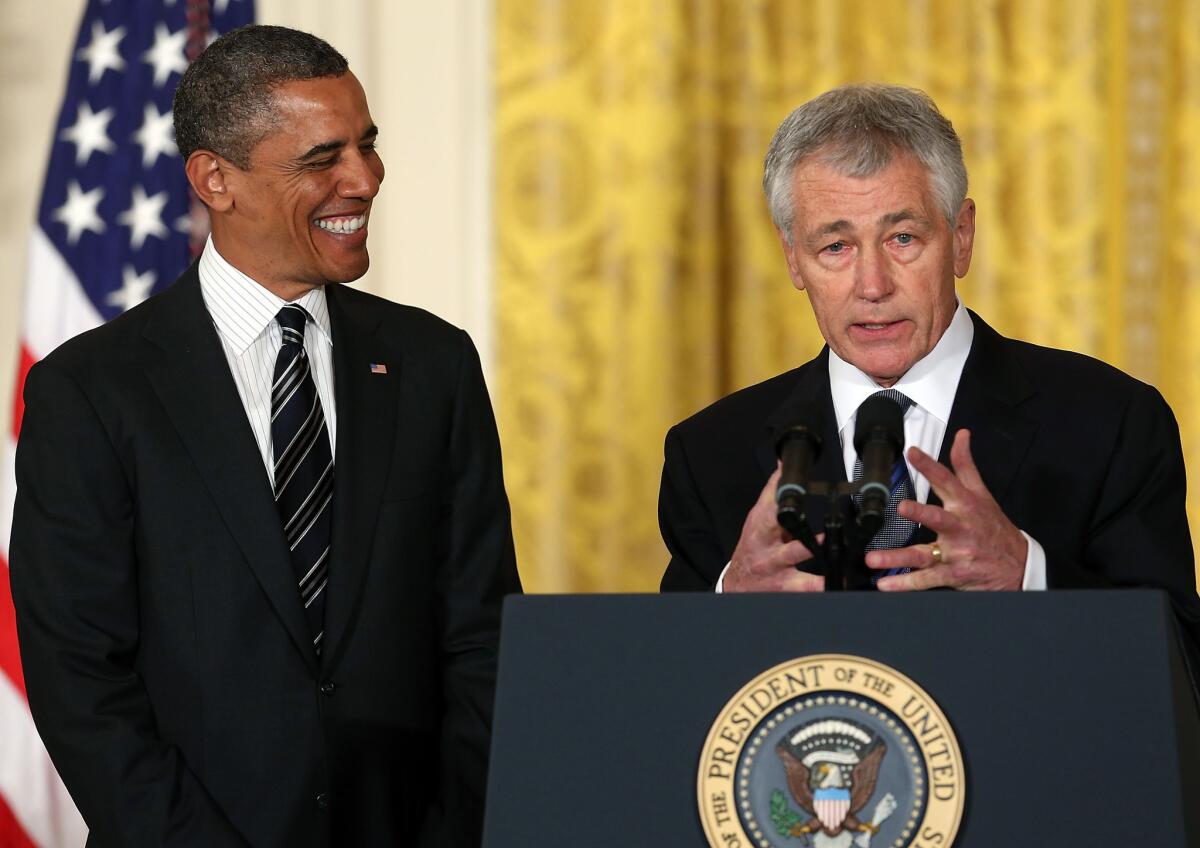Goldberg: A petty decision by Obama

It’s official. President Obama has named former Sen. Chuck Hagel (R-Neb.) as his nominee for secretary of Defense. Hence, we may be in store for the worst Defense secretary nomination fight since George H.W. Bush’s failed appointment of Sen. John Tower (R-Texas) more than 20 years ago.
The interesting question is, why? Why waste the political capital? Why pass over more qualified candidates who would sail through confirmation, including Michele Flournoy — who’d be the first female Defense secretary?
The most ridiculous answer is among the mainstream media’s favorites: bipartisanship. According to Politico, the choice “appeals to Obama’s bipartisan spirit.” The Washington Post, in a front-page news story, says that a “successful nomination of Hagel would add a well-known Republican to the president’s second-term Cabinet at a time when he is looking to better bridge the partisan divide, particularly after a bitter election campaign.”
What is particularly bizarre about this talking point is that it often appears in articles that go on to talk about how tough and grueling the nomination battle will be thanks to strong Republican opposition. So which is it? Is it a bridge across the partisan divide? Or is it an “in-your-face” nomination (South Carolina Sen. Lindsey Graham’s words) aimed at eliciting a fight with Republicans?
At least from the perspective of nearly everyone on the right, it’s the latter. Whether it’s payback for the scuttled non-nomination of Susan Rice to be secretary of State or whether it’s simply of a piece with Obama’s efforts to divide and conquer the GOP that were on display throughout the “fiscal cliff” negotiations, the consensus in much of conservative Washington is that Obama is making this nomination at least in part out of spite.
Indeed, that’s one major reason Hagel has so many unlikely friends these days. Hagel — never overburdened with too heavy a reputation for insight, knowledge or humility — is loathed, with ample justification, by many foreign-policy hawks, Israel supporters and neocons (those are overlapping but hardly synonymous groups, by the way). He is arguably the most prominent opponent of sanctions on bad actors in the Middle East. He’s heaped scorn on those who’d take a hard line with Iran. His geopolitical acumen is of the sort that fails to shine even in the comment sections on blogs. The Iraq war, for example, was according to Hagel a war for oil.
And Hagel’s views on Israel are, to be generous, hard to reconcile with those of the man who successfully campaigned for president just a couple of months ago as a staunch friend of that country. Even if Hagel’s gaffe about the perfidious influence of the domestic “Jewish lobby” was accidental, his coolness to Israel is hard to dispute. For instance, when Palestinian suicide bombers were tearing the country apart in 2002, Hagel insisted in an OpEd article that this was the time for Israel to “take steps to show its commitment to peace.”
For some, the thinking seems to be that if the Hagel nomination is a thumb in the eye of the neocon crowd, it must be worth it. David Greenberg writes in the New Republic that many “liberals are bending over backward to praise Hagel, in effect saying they would prefer an archconservative male mediocrity to a liberal female rising star.” Why? Because punishing Hagel’s enemies is worth a potentially lousy Defense secretary.
This spirit results in some really batty arguments for Hagel’s confirmation. For instance, New York Times columnist Roger Cohen writes that the “chief” reason Hagel should be confirmed is that doing so “will provoke a serious debate on what constitutes real friendship toward Israel.” Even if you agree with Cohen’s barmy views of geopolitical “friendship,” Hagel’s got real problems if this is the best case for his nomination.
The Defense Department faces imminent cuts, Chinese and Russian nationalism are ascendant, the Middle East is becoming even more destabilized and theocratic, and we’re still at war in Afghanistan, but Hagel’s chief qualification is that he’ll be a great conversation starter? Wow.
The coming nomination fight will undoubtedly focus on the strength of the case against Hagel. But the real indictment of Obama’s pick is the weakness of the case for Hagel — and the pettiness of the pick in the first place.
jgoldberg@latimescolumnists.com
More to Read
A cure for the common opinion
Get thought-provoking perspectives with our weekly newsletter.
You may occasionally receive promotional content from the Los Angeles Times.











